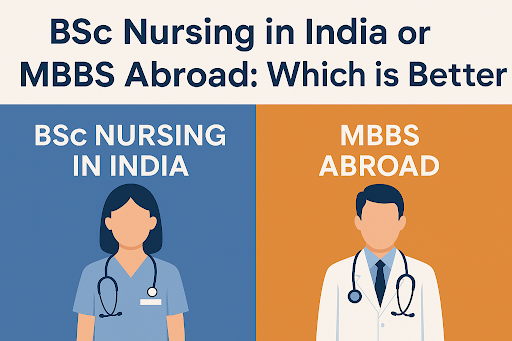Choosing a career in the healthcare sector is both noble and strategic. However, when it comes to selecting the right path, students often find themselves stuck between two popular options: pursuing BSc Nursing Course in India or going abroad for an MBBS. Both choices offer promising futures but come with different requirements, career outcomes, and financial implications.
So, which is the better option? The answer depends on your goals, budget, academic capability, and long-term vision.
Understanding Both Paths
BSc Nursing in India
- Duration: 4 years
- Eligibility: 10+2 with Physics, Chemistry, and Biology (PCB)
- Average Fee: ₹50,000 – ₹2.5 lakhs/year (in private institutions)
- Career Path: Staff Nurse, Nursing Officer, Clinical Instructor, Nurse Practitioner, etc.
- Higher Studies: MSc Nursing, Nurse Practitioner Courses, Hospital Administration
MBBS Abroad
- Duration: 5 – 6 years (depending on country)
- Eligibility: 10+2 with PCB + NEET qualification
- Average Fee: ₹20 lakhs – ₹60 lakhs total (depending on country)
- Popular Countries: Russia, Ukraine, Philippines, China, Georgia, Kazakhstan
- Career Path: Doctor (general physician), later specialization through PG/MD
Key Comparison Factors
1. Cost of Education
- BSc Nursing in India is significantly more affordable, especially in government colleges.
- MBBS Abroad can be 10x more expensive, including tuition, living costs, travel, and exam fees.
2. Return on Investment (ROI)
- Nursing offers quicker employment opportunities with relatively stable income.
- MBBS can take longer to yield returns, especially considering the mandatory FMGE exam (Foreign Medical Graduate Examination) for practicing in India.
3. Job Opportunities
- Nurses are in high demand in India and globally, especially with increasing healthcare needs.
- MBBS graduates from abroad may struggle initially due to licensing exams and limited PG seats in India unless they stay abroad to practice.
4. Difficulty Level
- Nursing focuses more on patient care, clinical practice, and less on competitive exams.
- MBBS is academically rigorous, requires passing NEET and FMGE/NExT (for foreign grads).
5. Migration & Global Opportunities
- Nurses have a clear pathway for migration to countries like the UK, Canada, and Australia.
- MBBS graduates from certain countries may not get direct licensing abroad without further studies or exams.
6. Respect and Social Perception
- In India, MBBS doctors are often more respected socially compared to nurses.
- However, globally, nursing is a highly regarded profession, especially in Western countries.
When to Choose BSc Nursing in India
- You want a cost-effective medical career.
- You wish to start working early (within 4 years).
- You are open to global nursing migration.
- You’re more interested in caregiving and clinical support roles.
When to Choose MBBS Abroad
- You are passionate about becoming a doctor but couldn’t get a seat in Indian medical colleges.
- Your family can support the financial investment.
- You are ready to prepare for FMGE/NExT and possibly pursue PG abroad.
- You aim to settle and practice in the same country you study in.
Final Verdict
There is no one-size-fits-all answer. Both BSc Nursing in India and MBBS abroad can lead to rewarding careers in healthcare—but they follow very different paths. If you’re looking for an affordable, secure, and high-demand profession, BSc Nursing is a great choice. If you’re committed to becoming a doctor and can manage the cost and challenges, MBBS abroad may be worth it.
Whatever you choose, make sure your decision aligns with your passion, budget, and long-term goals—not just peer pressure or social status.

